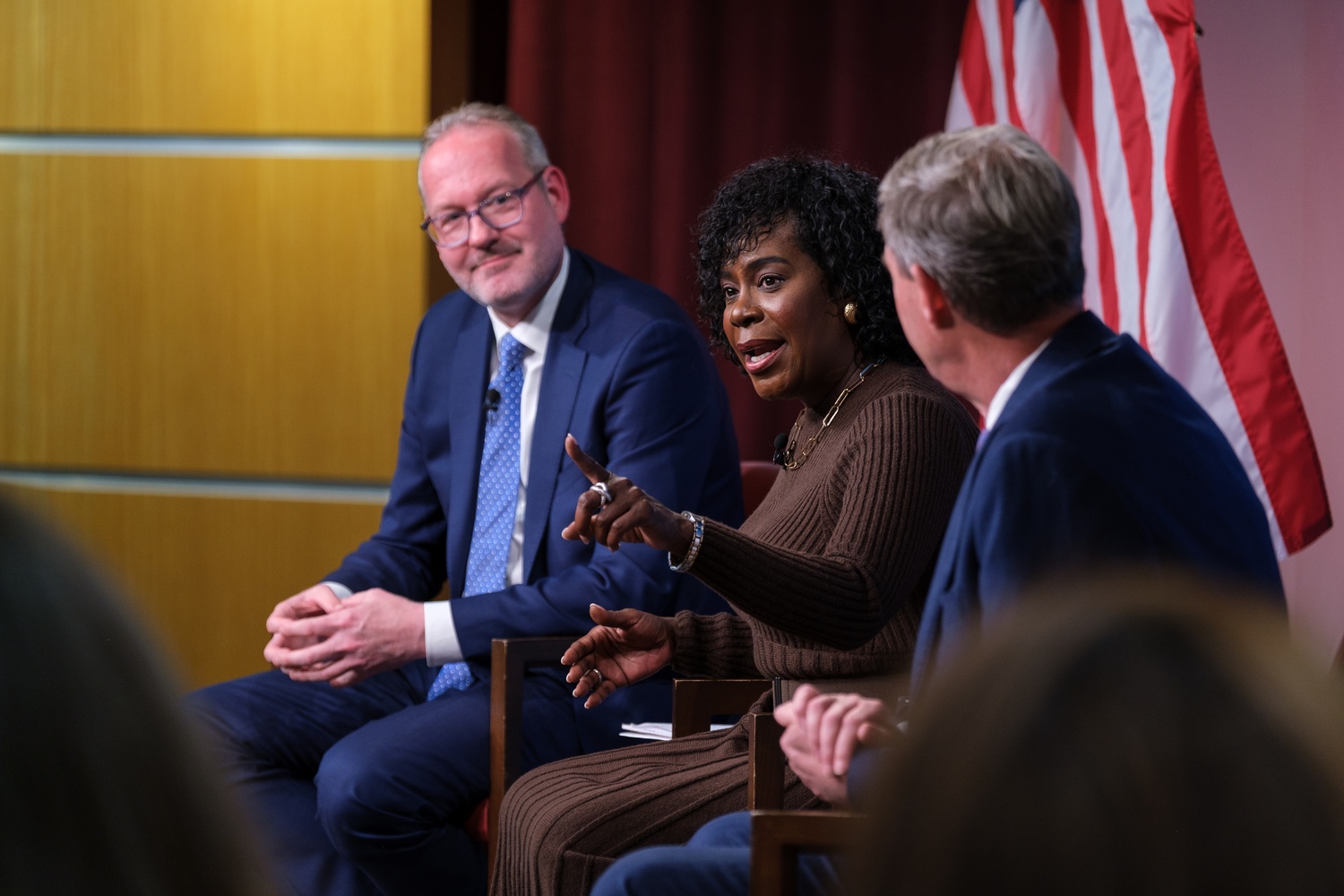
News
Summers Will Not Finish Semester of Teaching as Harvard Investigates Epstein Ties

News
Harvard College Students Report Favoring Divestment from Israel in HUA Survey

News
‘He Should Resign’: Harvard Undergrads Take Hard Line Against Summers Over Epstein Scandal

News
Harvard To Launch New Investigation Into Epstein’s Ties to Summers, Other University Affiliates

News
Harvard Students To Vote on Divestment From Israel in Inaugural HUA Election Survey
‘We’re Doers, We’re Fixers’: Philadelphia, Columbia Mayors Extol Possibilities of Local Government at IOP Forum

Mayors Cherelle L. Parker of Philadelphia and Daniel J. Rickenmann of Columbia, South Carolina, celebrated local leaders’ ability to solve problems across political divides at an Institute of Politics forum on Thursday.
Parker, a former Pennsylvania state representative who took office as mayor in January 2024, said that — unlike state and federal officials — mayors had to address local problems immediately, rather than kicking the can down the road.
“We’re doers, we’re fixers. People don’t care about what’s happening, quite frankly, at the state or either federal levels,” Parker said. “Mayors don’t get the luxury of not fixing the problem. We are action words. They expect us to fix things.”
More than 100 students and academics attended the forum, which was co-sponsored by the Bloomberg Center for Cities at Harvard University and the Taubman Center for State and Local Government. The forum was moderated by Harvard Kennedy School lecturer Jorrit de Jong, director of the Bloomberg Center for Cities.
Both mayors used the forum as a chance to encourage students to work in local government, which they described as often more effective and impactful than national politics.
Rickenmann said that at the local level, politicians must be responsive to their constituents in a different way than state and federal leaders and are often asked to address unexpected issues as they arise.
“I gotta go to the grocery store, I gotta go to church. I gotta walk down Main Street. I can’t hide in my office,” Rickenmann said. “People expect us to fix these problems. I don’t care if it’s a pothole or if it’s mental health — even if it’s not in our purview, we were expected to do it.”
Parker, a Democrat, and Rickenmann, a Republican, emphasized the bipartisan elements of their jobs. Parker said that during her experience serving with Republicans in Pennsylvania’s divided state legislature, saying that politicians can unite across rural-urban splits to pursue shared policy goals.
“Don’t talk to me about controlling the flow of illegal handguns, because we are never going to agree. Don’t talk to me about choice, because I’m a debater all day long about where I stand,” she said. “Don’t talk to me about voter ID, because we will never agree. But Mr. Mayor, let’s get together and talk about how we make housing affordable.”
Rickenmann — who described himself as a “Republican mayor in a blue city in a red state” — discussed his work with business leaders and residents to earn a LEED Gold certification for the city of Columbia.
“It’s the language and it’s our ability to create these working relationships of taking a commonality problem and bringing folks together, and that’s what mayors can do much better than anybody,” Rickenmann said.
Both Rickenmann and Parker said that mayors could lead more effectively when they paid attention to what local leaders were doing in other cities. Rickenmann said that, as his office developed a plan to improve traffic safety in Columbia, he spoke with Denver mayor Michael B. Hancock, who served until 2023.
Hancock’s office sent Rickenmann a study on traffic infrastructure and regulations in Denver, which Hancock told him cost $250,000 to produce, according to Rickenmann. Rickenmann said that working with the Denver data gave a leg up in devising his own plan for Columbia.
Rickenmann added that he valued his collaborative relationships with mayors worldwide.
“I bet I got seven texts today just from other mayors, talking about issues going on and how we’re supporting each other,” he said.
Both Rickenmann and Parker lead cities that are home to major research universities, and at Thursday’s talk, they described how they used university research to inform their policy programs.
Parker — who recently announced a $60 million land purchase by Comcast, which plans to demolish several buildings in alignment with a city project to revitalize the downtown corridor known as East Market Street — also touted the importance of public-private partnerships.
She said academic research, including the influential scholarship of Harvard economist Raj Chetty ’00, have drawn attention to the lack of economic mobility in Philadelphia — encouraging philanthropic groups and businesses, like Comcast, to support programs to enhance upward mobility.
“Now the private sector, all of the industries thriving in the city of Philadelphia’s region, have come together,” Parker said. “Think about Comcast, our largest private sector and employee philanthropic groups, and we are now fixing the problem together.”
“That’s how you all help us scale,” she said to her audience at Harvard.
Want to keep up with breaking news? Subscribe to our email newsletter.
